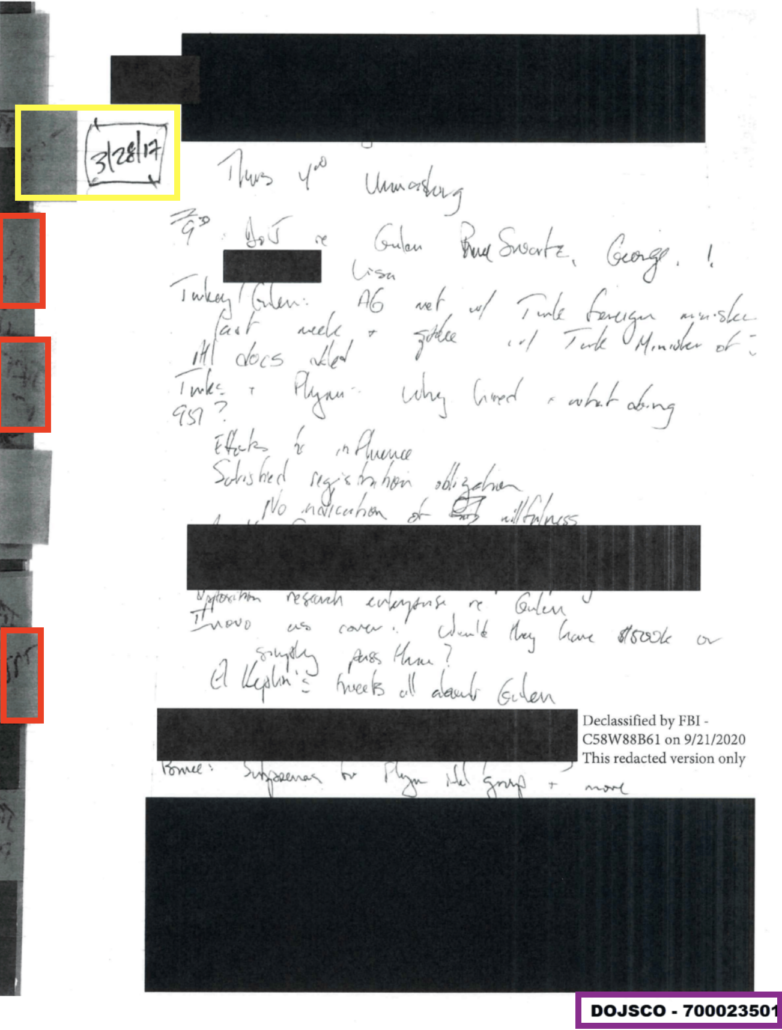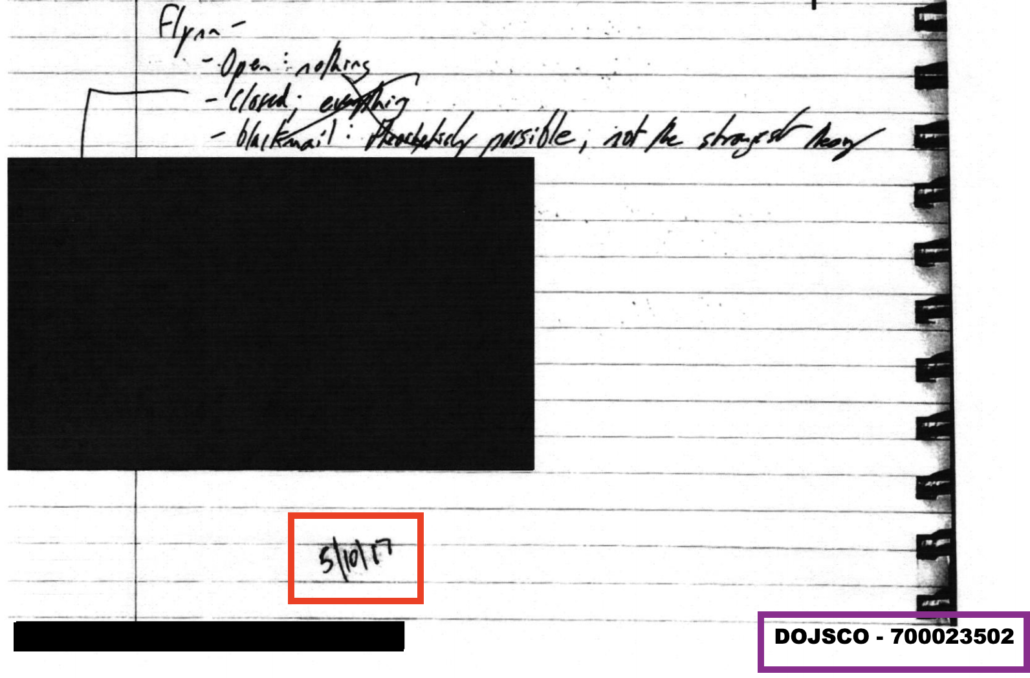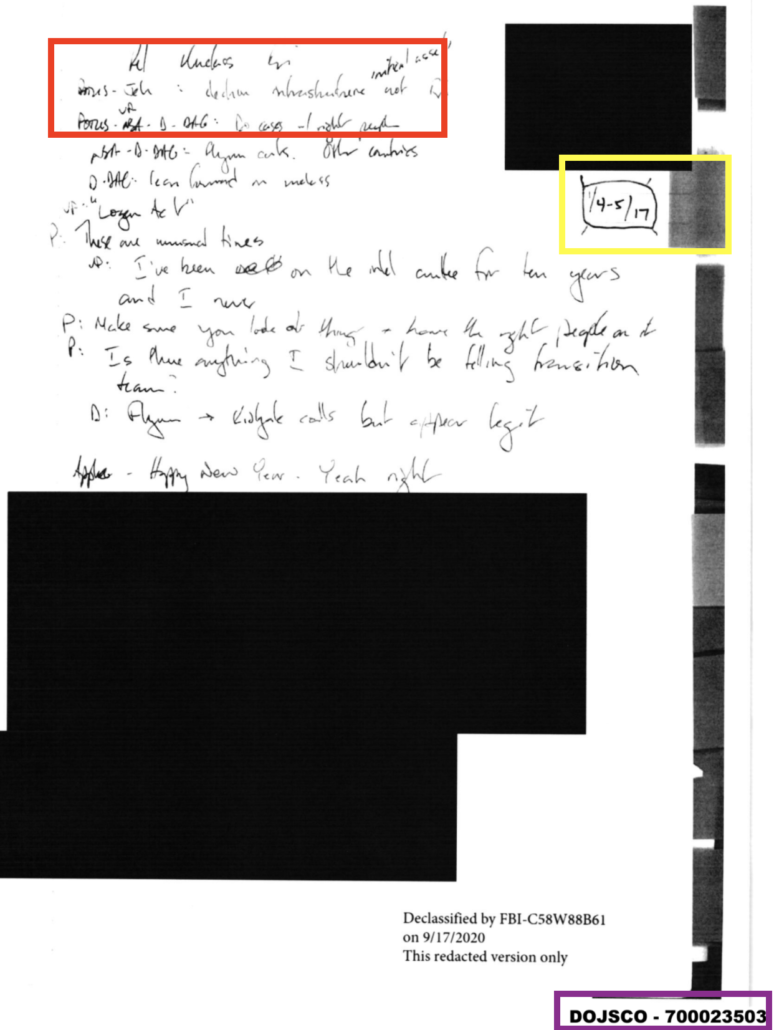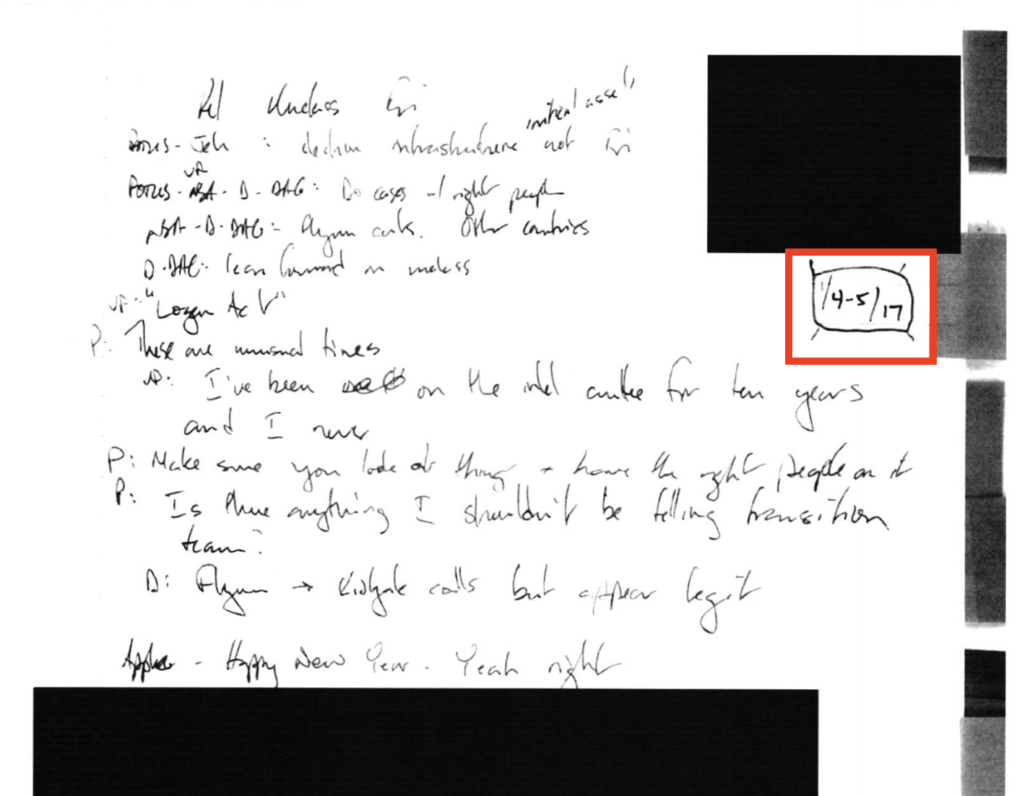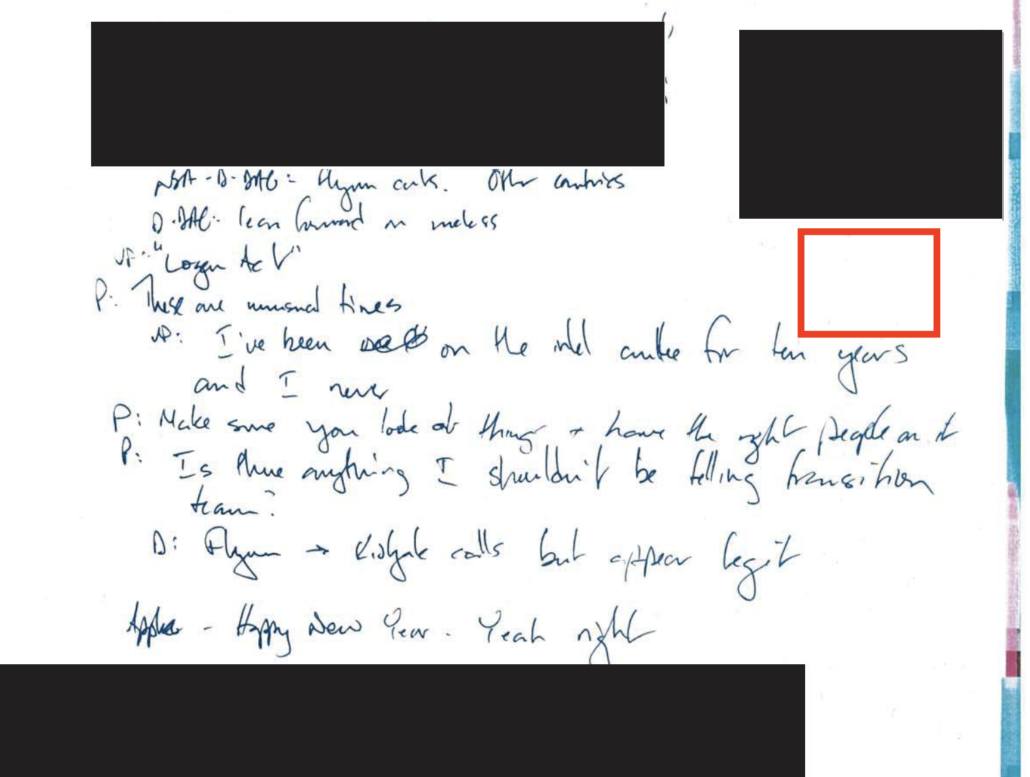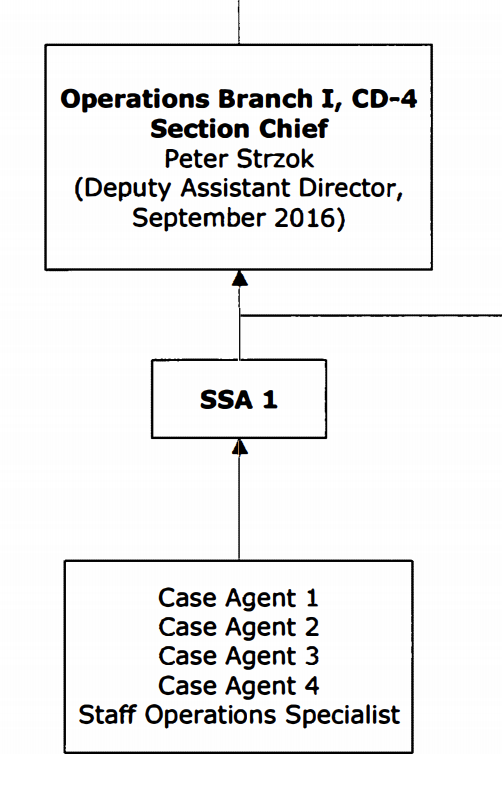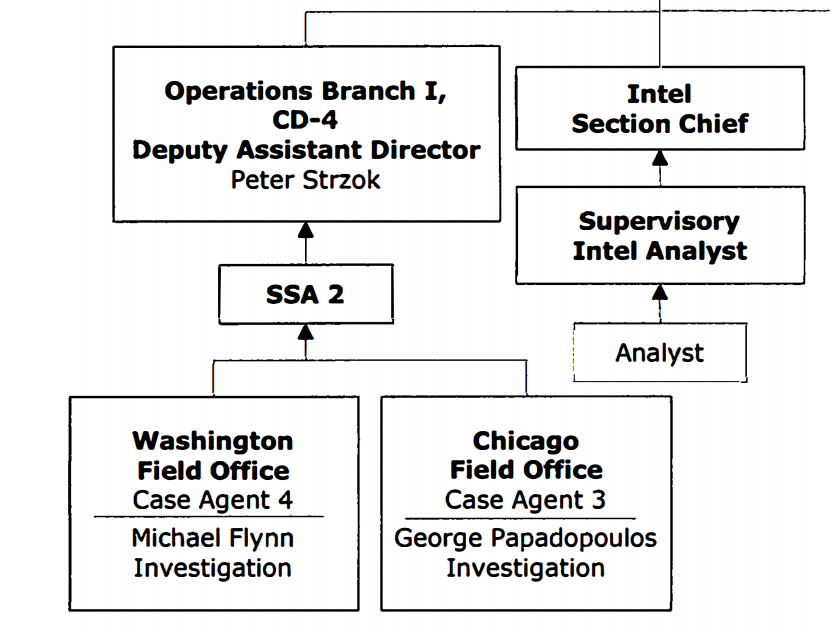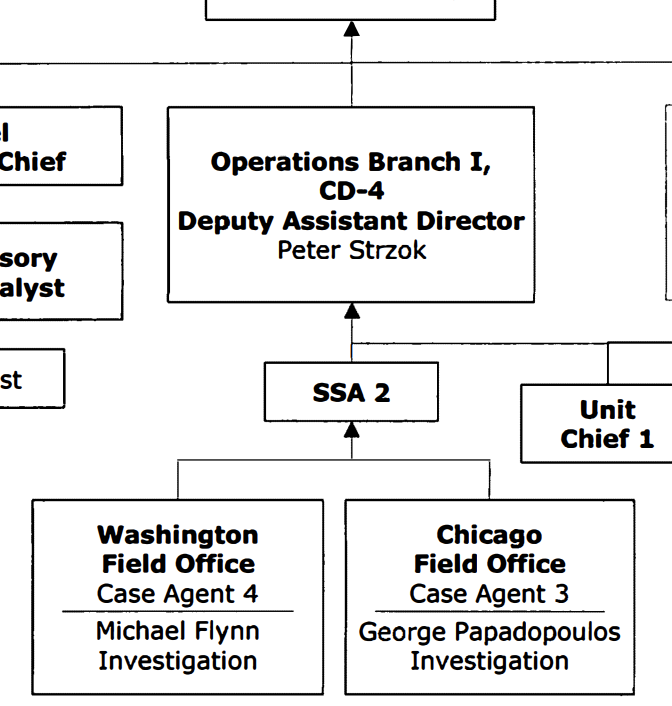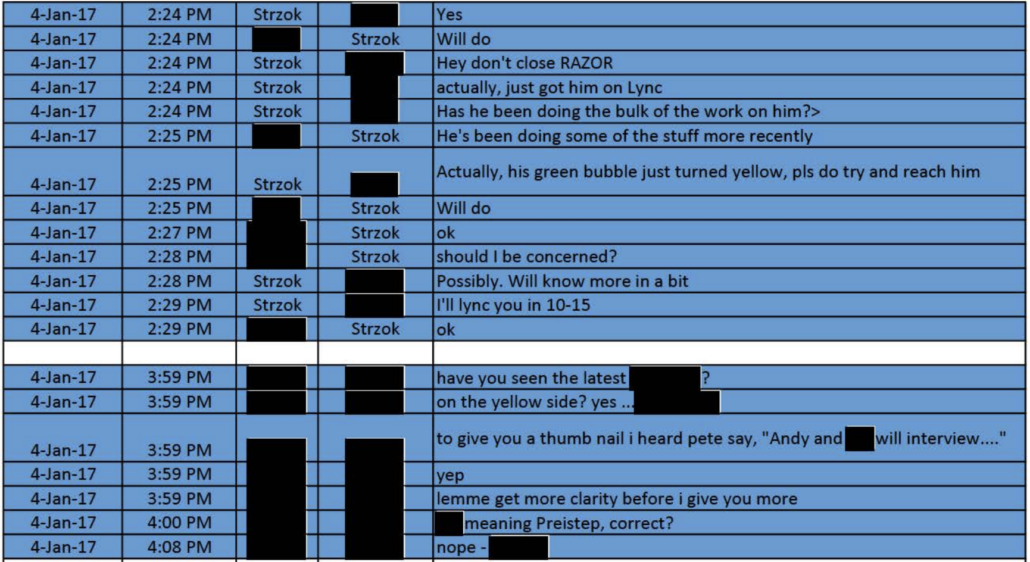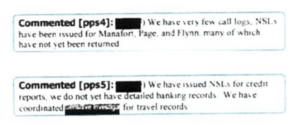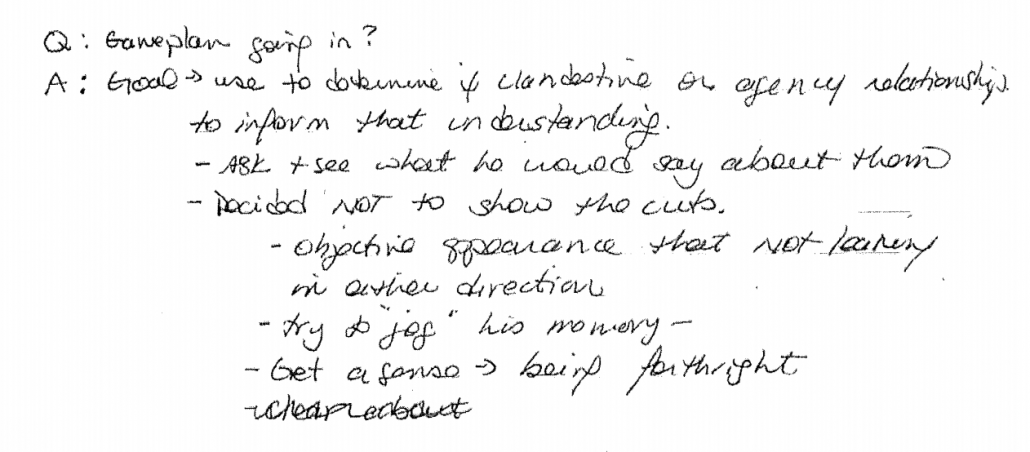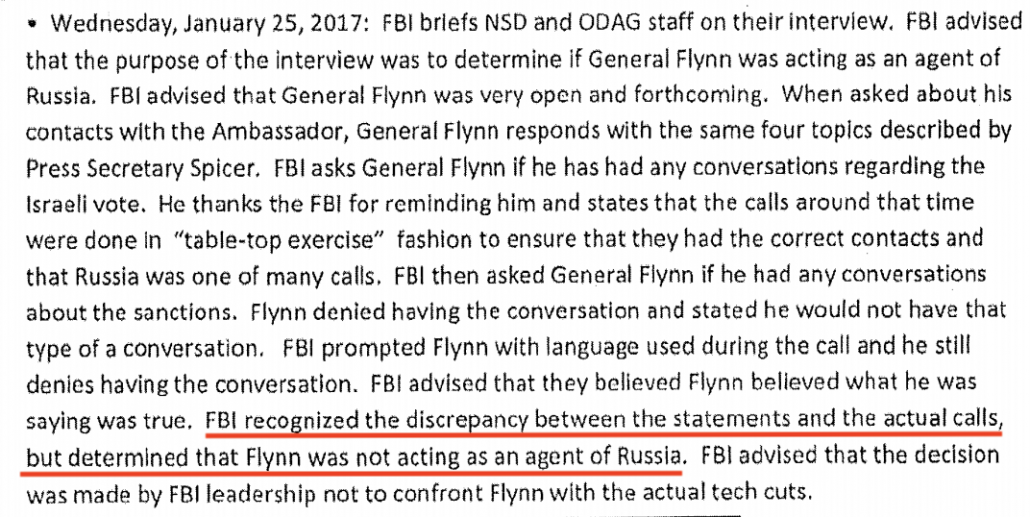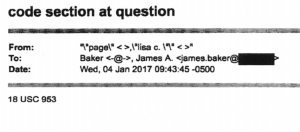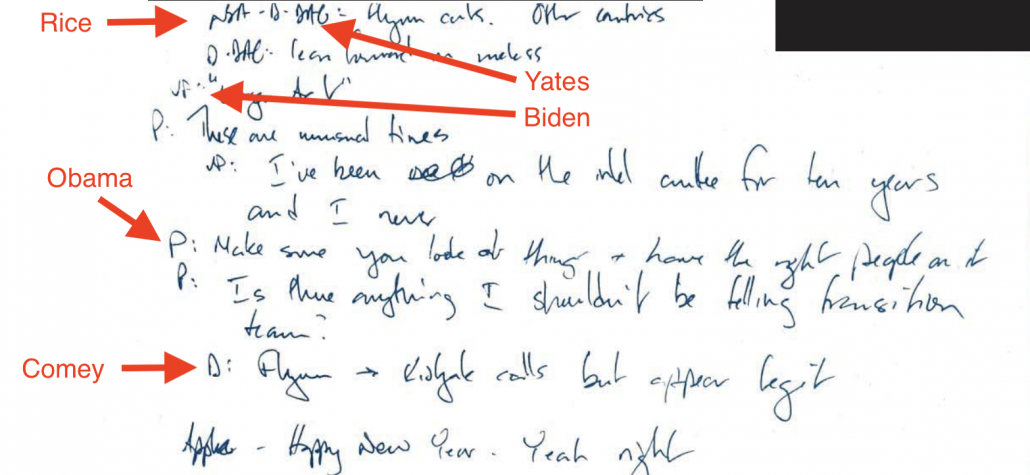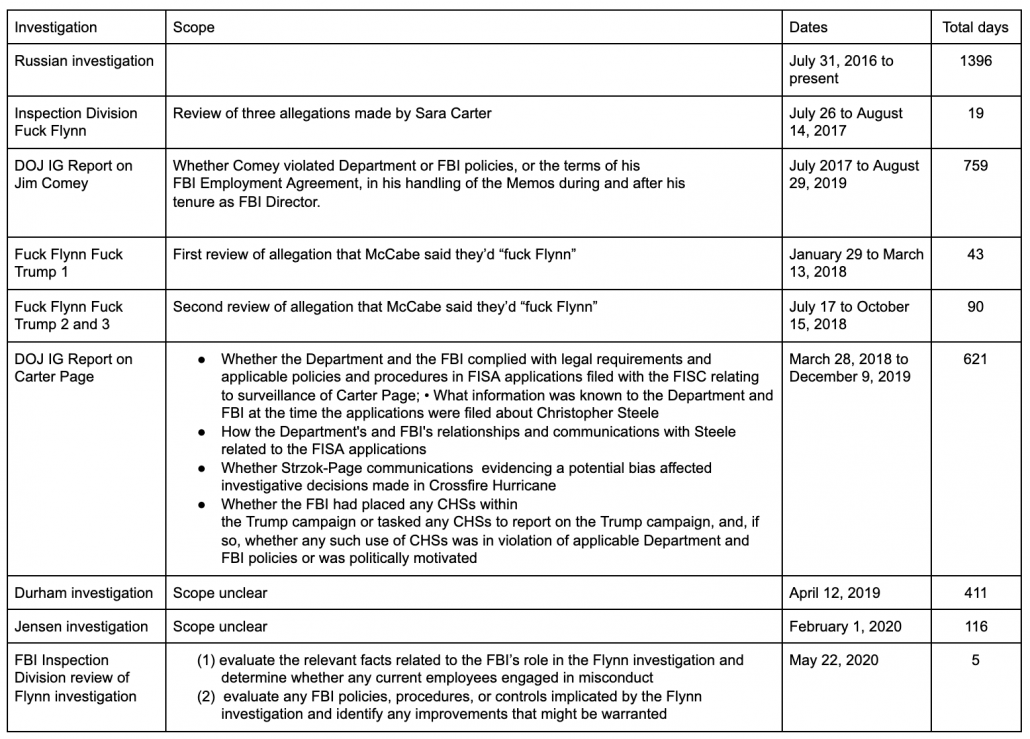The Jeffrey Jensen “Investigation:” Post-It Notes and Other Irregularities
I noted the other day that Jeffrey Jensen had not asked William Barnett some basic questions (such as the import of Mike Flynn’s lies to the decision to interview Flynn or the names of colleagues who had purportedly joked about “wiping” their phones) that you would expect from a half-serious investigation. That’s ironic, since one of Barnett’s allegations about Mueller’s investigators is that they didn’t ask basic follow-up questions (the public record conflicts with a number of Barnett’s claims about the Mueller investigation).
Given my discovery about differences between two versions of Peter Srtzok’s notes purportedly “discovered” in the Jensen investigation, I want to look more closely at what the Bates stamps and Post-It note practices of the investigation suggest about it. I believe I have put all the documents released under the guise of the Jensen investigation here (though have not finished annotating them). I’ve put what delivery correspondence got released explaining those documents below (I’ve updated these on 9/29).
Both Bates series are labeled SCO documents even when they’re not SCO documents
There are actually two sets of Bates stamps among the exhibits submitted in an effort to blow up the Flynn prosecution.
One series includes Bates stamps DOJSCO700021192-21198 (Joe Pientka and Peter Strzok’s notes from Flynn’s interview), DOJSCO700021201-21205 (Peter Strzok’s July 19, 2017 302). and DOJSCO 700022308-12 (a version of the January 24, 2017 Flynn 302). Here’s what the typeface of that Bates stamp looks like:
These reflect documents turned over to Flynn in discovery before Barr started blowing up the prosecution (see this Strzok 302 and his notes included as part of this exhibit). These were all submitted with the Motion to Dismiss on May 7, 2020. The inclusion of documents with an earlier stamp is not at all nefarious. Indeed, it helps to distinguish three different types of documents submitted with the Motion to Dismiss:
- Documents already turned over to Flynn, which were submitted accompanying the MTD with their original Bates stamp
- Documents Sidney Powell had asked for but which Emmet Sullivan rejected as Brady discovery; these have no Bates stamp (though Sullivan has reviewed some of these documents)
- Documents that were “discovered” as “new” to justify the Motion to Dismiss; they have the later Bates stamp
Here’s an example of the Jensen typeface:
Remember: these weren’t new to the FBI Agents or prosecutors on the team. They were just “new” to Jeffrey Jensen, who was brought in from St. Louis just to provide the documents a virgin birth.
The one “tell” about this Bates stamp is that it incorporates documents that well precede the Mueller investigation, and probably weren’t part of the Mueller investigation, under an SCO stamp.
I guess “BillyBarrBlowsUpBobby3Sticks” would be too obvious.
Bill Priestap’s original notes, with sticky note, has two Bates numbers
Once you get into the Jensen Bates stamp, documents often get submitted over and over. The most remarkable example of that are Bill Priestap’s notes from a January 24, 2017 meeting prior to the Flynn interview. Bates DOJSCO 700023464 was submitted twice (because Flynn’s lawyers screwed up the upload), once as part of Docket #188 and again as part of Docket #190. Then, the exact same document was submitted as DOJSCO 700022702 as part of the Motion to Dismiss.
This is interesting for two reasons. It’s common to find the same document with two different Bates stamp numbers. For example, if four people have received the same email, it may show up in discovery four times, with four different Bates stamps. But that’s more common with electronic files, for obvious reasons.
But this is not multiple digital versions of the same document. Both copies have the same blue sticky note on it, meaning both exhibits were scanned (or were from the same scan).
That wouldn’t be all that weird if the digital exhibits submitted with the Motion to Dismiss had different Bates numbers. But they generally don’t. For example, William Barnett’s draft Closing Communication has Bates stamp DOJ SCO 700023466 in both the exhibit Flynn’s team released on April 30 and the version submitted with the Motion to Dismiss.
The most curious detail of the two instances of the original copy of Priestap’s notes is that the one submitted later, with the Motion to Dismiss, has a much earlier (762 pages) Bates stamp. My eyes are beginning to blur, but I think the one other instance of this involves three documents involving Peter Strzok in advance of the Mike Flynn interview.
The earlier Bates notes might suggest that those select documents from January 23 and 24 were found — perhaps even before Jensen began work — and the disclosure theater in service of the Motion to Dismiss all followed it.
If that’s true, DOJ’s failure to release Priestap’s 302 explaining all this is fairly damning, given that DOJ is suppressing his explanation even while re-releasing the same documents.
DOJ falsely presents annotations as unaltered hand-written notes, misleadingly so with one set of Strzok notes
Which brings me to where I started this rabbit hole: with Jensen’s treatment of hand-written notes. I’ll probably miss something but I think the hand-written notes released by Jensen include:
- January 5, 2017 Peter Strzok notes (earlier, undated version)
- January 5, 2017 Peter Strzok notes (later, incorrectly dated version)
- January 24, 2017 Bill Priestap notes (version A, version B)
- January 24, 2017 Peter Strzok and Joe Pientka notes
- January 25, 2017 Tashina Gauhar notes
- January 25, 2017 Peter Strzok notes
- March 28, 2017 Peter Strzok notes
- March 30, 2017 notes involving Dana Boente
- May 10, 2017 Andrew McCabe notes
The interview notes are a different animal (though remember that FBI got the mixed up and no one figured it out for months, possibly until I pointed it out).
Whoever took the Boente notes added a date in real time. That’s likely, though not certain, in the case of Gauhar. Priestap almost certainly dated his own notes (though it’s unclear who put that blue sticky on them).
In the unredacted bits, there is no date on Strzok’s January 25 notes. As noted, the originally released version of Strzok’s notes, which is a scan of the original, has no date (and Jeffrey Jensen provided Sidney Powell a range rather than the obvious date of January 5 for them, so she could make a false claim about Joe Biden).
The copy of Strzok’s March 28, 2017 notes, Bates Stamp 700023501 has the date added. It appears to have been added with a Post-It (annotated in yellow). It also appears that you can see Post-It note tabs (annotated in red) picked up on the copy, some with notes on them.
It appears, then, that someone simply made a copy of the notes without taking them out of a notebook. I have no reason to believe the date is inaccurate, though I am intrigued by the way the redaction obscures what would be the edges of the date Post-It.
The date on Andrew McCabe’s notes, with a Bates stamp 700023502, the next in the series, appears to have been added after the fact by someone other than the person who took the notes. While it has some similarities with the date on the Strzok notes, it doesn’t cross the 7 as one of the two Strzok annotations did, and could easily have been added by whoever filed the notes in real time.
Finally, the new version of Strzok’s January 5, 2017 notes, with a Bates stamp 700023503 and so the next in a series, include the added date and some newly unredacted content (inside the red rectangle).
As noted, there is absolutely no doubt that these notes were written on January 5, 2017 (indeed, the newly unredacted details match other versions of this meeting). But after having released an unannotated version of this document, Jensen (or whoever is running this rodeo) decided to release another version that affirmatively misleads about that certainty.
The other instances of these date annotations are not nefarious, as far as I understand it. But pretending there was confusion about the date of these notes served to support an attack on Joe Biden. And rather than clearing all that up, DOJ has done what Kevin Clinesmith faces prison time for having done: alter a record.
It is inaccurate to say these are “Peter Strzok’s hand-written notes” (and, if the McCabe date was added after the fact, those too). Rather, this is a copy of Strzok’s hand-written notes that appear as a page in someone’s investigative notebook, and the date reflects an alteration — not identified to the court — to Strzok’s notes, an alteration that introduces an error.
Let me clear: I don’t think the dates change the investigative significance of these notes. I believe the January 5 notes have zero investigative significance, taken in context. I think the redaction of Brandon Van Grack’s name — if that’s what happened in William Barnett’s 302 — is a far graver example of abuse, because it serves to hide the baselessness of DOJ and Flynn’s complaints.
Rather, all these details reflect what an amateur effort Barr’s effort to blow up Flynn’s prosecution is. These irregularities, while not dramatically affecting the underlying evidentiary claim (excepting Powell’s attack on Joe Biden), suggest that no one is conducting a real investigation that would have to sustain future judicial review. They’re doing nothing except producing propaganda.
April 24: Jocelyn Ballantine files notice of discovery correspondence along with that correspondence.
Beginning in January 2020, at the direction of Attorney General William P. Barr, the United States Attorney for the Eastern District of Missouri (“USA EDMO”) has been conducting a review of the Michael T. Flynn investigation. The review by USA EDMO has involved the analysis of reports related to the investigation along with communications and notes by Federal Bureau of Investigation (“FBI”) personnel associated with the investigation.
The enclosed documents were obtained and analyzed by USA EDMO in March and April 2020 and are provided to you as a result of this ongoing review; additional documents may be forthcoming. These materials are covered by the Protective Order entered by the Court on February 21, 2018.
April 24: Powell submits two documents obtained from Covington & Burling, a Rob Kelner email indicating that C&B has an understanding that Mueller is unlikely to charge Jr, and another letter making it quite clear that Mueller did not make promises.
April 29: Ballantine files notice of discovery correspondence along with that correspondence.
As we disclosed by letter dated April 24, 2020, beginning in January 2020, at the direction of Attorney General William P. Barr, the United States Attorney for the Eastern District of Missouri (“USA EDMO”) has been conducting a review of the Michael T. Flynn investigation. The enclosed documents were obtained and analyzed by USA EDMO in March and April 2020, and are provided to you as a result of this ongoing review; additional documents may be forthcoming.1 These materials are covered by the Protective Order entered by the Court on February 21, 2018.
1 Note that the enclosed spreadsheet (DOJSCO-700023473 – DOJSCO700023475), which contains messages between and among various Bureau personnel, is an index and another detailed version of these messages is forthcoming.
May 5: Ballantine files notice of discovery correspondence along with that correspondence.
As we disclosed by letter dated April 24, 2020, beginning in January 2020, at the direction of Attorney General William P. Barr, the United States Attorney for the Eastern District of Missouri (“USA EDMO”) has been conducting a review of the Michael T. Flynn investigation. The enclosed documents were obtained and analyzed by USA EDMO in March, April and May 2020; additional documents may be forthcoming. These materials are covered by the Protective Order entered by the Court on February 21, 2018.
May 18: Ballantine files notice of discovery correspondence along with that correspondence.
As we disclosed by letter dated April 24, 2020, beginning in January 2020, at the direction of Attorney General William P. Barr, the United States Attorney for the Eastern District of Missouri (“USA EDMO”) has been conducting a review of the Michael T. Flynn investigation. The enclosed documents were obtained and analyzed by USA EDMO in March, April and May 2020; additional documents may be forthcoming. These materials are covered by the Protective Order entered by the Court on February 21, 2018.
June 23: Ballantine files notice of discovery correspondence along with that correspondence.
As we have previously disclosed, beginning in January 2020, the United States Attorney for the Eastern District of Missouri has been conducting a review of the Michael T. Flynn investigation. The enclosed document was obtained and analyzed by USA EDMO during the course of its review. This page of notes was taken by former Deputy Assistant Director Peter Strzok. While the page itself is undated; we believe that the notes were taken in early January 2017, possibly between January 3 and January 5. These materials are covered by the Protective Order entered by the Court on February 21, 2018; additional documents may be forthcoming.
June 24: Powell accuses Biden of starting the Logan Act investigation based off false date on Strzok notes.
July 7: Ballantine files notice of discovery correspondence along with that correspondence.
As we have previously disclosed, beginning in January 2020, the United States Attorney for the Eastern District of Missouri has been conducting a review of the Michael T. Flynn investigation. The enclosed documents were obtained and analyzed by USAO EDMO during the course of its review. The documents include handwritten notes of former Deputy Assistant Attorney General Tashina Gauhar from a January 25, 2017 meeting (23487-80), notes of former Deputy Assistant Director Peter Strzok from that same meeting (23491-92), an internal DOJ document dated January 30, 2017 (23493-97), and handwritten notes of then Acting Attorney General Dana Boente, dated March 30, 2017 (23498-500). These materials are covered by the Protective Order entered by the Court on February 21, 2018; additional documents may be forthcoming.
September 23: Ballantine sends Powell notice of new exhibits without noticing Judge Sullivan of the correspondence.
As we have previously disclosed, beginning in January 2020, the United States Attorney for the Eastern District of Missouri has been conducting a review of the Michael T. Flynn investigation. The enclosed documents were obtained and analyzed by USAO EDMO during the course of its review. The documents include handwritten notes of former Deputy Assistant Director Peter Strzok (23501 & 23503) and former Deputy Director Andrew McCabe (23502); and internal text messages between FBI analysts who worked on the Flynn matter (23504- 23516).
We are also providing you with additional text messages between former DAD Strzok and Lisa Page (23516-23540). As you know, some of these messages were originally made available to Flynn’s former attorneys on March 13, 2018 through a publicly available link to a Senate webpage. On June 24, 2018, the government provided a link to a second website that contained additional text messages. In an abundance of caution, we are providing you additional text messages in this production; please note that purely personal messages have been deleted from this production.
September 24: Powell files supplement quoting notice.
The documents include handwritten notes of former Deputy Assistant Director Peter Strzok (23501 & 23503) and former Deputy Director Andrew McCabe (23502); and internal text messages between FBI analysts who worked on the Flynn matter (23504- 23516); . . . additional text messages between former DAD Strzok and Lisa Page (23516-23540).
September 24: Ballantine sends Powell notice of new exhibits without noticing Judge Sullivan of the correspondence.
As we have previously disclosed, beginning in January 2020, the United States Attorney for the Eastern District of Missouri has been conducting a review of the Michael T. Flynn investigation. The enclosed documents were obtained and analyzed by USAO EDMO during the course of its review. Attached hereto is a summary of the National Security Letters issued by the FBI (23541-42) and a related email (23543-44).
September 24: Ballantine sends Powell notice of the William Barnett 302 without noticing Judge Sullivan an unclassified version was shared with Flynn’s team.
As we have previously disclosed, beginning in January 2020, the United States Attorney for the Eastern District of Missouri has been conducting a review of the Michael T. Flynn investigation. On September 17, 2020, United States Attorney Jeffery Jenson conducted an interview of Special Agent William J. Barnett. A copy of the report of that interview is attached to this letter. The government is filing a redacted version of this report of interview as an attachment to its supplemental motion to dismiss tonight.
The unredacted version of the report of interview is covered by the Protective Order entered by the Court on February 21, 2018, and is designated “sensitive.”
September 27: Ballantine sends Powell notice of new exhibits without noticing Judge Sullivan of the correspondence.
As we have previously disclosed, beginning in January 2020, the United States Attorney for the Eastern District of Missouri has been conducting a review of the Michael T. Flynn investigation. The enclosed documents were obtained and analyzed by USAO EDMO during the course of its review. Attached hereto is are notes of three ODAG attorneys, numbered 23559- 23562
September 28: Ballantine files four different notices of discovery correspondence at once (resulting in delayed notification to John Gleeson).





